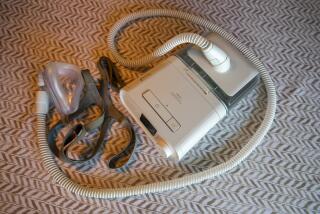FDA urged to rethink approval of medical devices
Reporting from Washington — Katherine Ayers was 36 when she decided the pain in her hip had become too much to bear. A surgically implanted metal-on-metal hip joint soon made her pain-free.
But a few years later, she was startled to receive a letter saying the artificial joint was being recalled.
“In my mind, recalls were for dishwasher and cars, not body parts,” she told a congressional hearing earlier this year. Ultimately, Ayers had to have a new implant.
It was experiences such as Ayers’ — and scores of others with even more serious consequences — that has led the Institute of Medicine, an arm of the National Academy of Sciences, to call on the government to design a new system for evaluating and approving many high-risk medical devices before they reach the market.
“It’s not clear that the … process is serving the needs of either industry or patients, and simply modifying it again will not help,” David Challoner, chairman of the committee that wrote the recommendation, said in a statement.
Medical devices range from simple adhesive strip bandages used for minor cuts to contact lenses and pacemakers. When complex devices fail, they can generate health problems and healthcare costs, even imperil lives.
Surprising as it may seem, the way the present system works is that thousands of devices are routinely cleared for market without any of the clinical testing for safety or effectiveness that is required for prescription drugs.
“I thought that any medical device that was actually being put into people’s bodies had been extensively tested before it was released to the public,” said Ayers.
Not exactly.
When the FDA was given responsibility for medical devices in 1976, Congress specified that those already on the market could continue to be sold without testing.
At the same time, Congress created the so-called 510(k) process under which new devices could be cleared for market if they were “substantially equivalent” to existing products.
As a result, thousands of medical devices have received FDA clearance based on older devices, neither of which were subjected to the kinds of rigorous pre-market testing required for pharmaceuticals.
Further, a study of high-risk recalls from 2005 to 2009 found that more than two-thirds of medical devices recalled for potentially serious risks went through the expedited-approval process.
More than 90,000 artificial hip joints were recalled last summer after studies showed that about 1 in 8 recipients needed to have them replaced. The implants, manufactured by a subsidiary of Johnson & Johnson, were found to release small metallic particles into patients’ bloodstreams over time.
In 2009, the Institute of Medicine noted, about 4,000 medical devices were cleared under the expedited 510(k) process — more than 90% of all devices subject to FDA clearance. Simple “devices” such as tongue depressors and adhesive strips can be sold without FDA clearance, although companies must notify the agency.
Critics contend that the 510(k) process amounts to a loophole for marketing products without adequate attention to safety or effectiveness.
Bowing to pressure from the Government Accountability Office and consumer groups, the FDA initiated two internal reviews of the process in 2009. This year, it outlined 25 changes it planned to make, including streamlining the review of lower-risk devices.
But the new recommendation, released Friday in a report requested by the FDA, was met with resistance from an agency official.
“FDA believes that the 510(k) process should not be eliminated,” Dr. Jeffrey Shuren, director of the agency’s medical devices arm, said in a statement about the new report. “But we are open to additional proposals and approaches for continued improvement of our device-review programs.”
Device manufacturers contend that the 510(k) process slows the flow of products to market.
“It is not technology, science, ingenuity or the economy that is standing in the way of success in developing new medical technologies. In my opinion, it is today the FDA,” engineer Robert Fischell told a subcommittee of the House Energy and Commerce Committee last week.
Fischell, inventor of an implantable insulin pump and a series of coronary stents, said that the medical device approval process is inconsistent and that the FDA staff is not sufficiently trained.
AdvaMed, a lobbying group that represents major manufacturers, rejected the findings of the new report, saying the committee “recommends entirely scrapping this proven process with a vague new plan that contains no useful guidance.”







